Snapshot from the opening party of Touko Laaksonen "Tom of Finland:" The Pleasure of Play at Artists Space38 Greene street, floor 3, New York Jun 14 - Aug 23, 2015
Steven Love photos and caption. “Bare as
you dare bike ride!! Living free, having fun, spreading peace and love! Awesome
day with a wonderful group of people.”
There are days when New York sparkles. Yesterday was it. From a meeting at the Commons to talk about Gundrisse to First Amendment and Bare as You Dare Bike rides, with an impromptu drop by at the opening of the the Touko Laaksonen "Tom of Finland:" The Pleasure of Play at Artists Space 38 Greene street, and then back to hanging with the gang, the day was everything I could have wanted.
Finishing class at the Commons, I rode to meet Brennan in the Lower East Side and then we zipped West to Christopher Street Pier, to join the Public Space Party First Amendment Dance Party at Christopher Street and the water.
As Monica wrote:
“It's that time of
year when we do the hard work of celebrating our First Amendment rights by dancing
in public space and swimming in public fountains. Yes!”
The invite for the
event was simple enough. “All over New York, public spaces are privatized and
so are ideas. We are left to wonder, is this a free speech zone or a speech
free zone. On - June 13th, we'll meet at Christopher street pier to test the
possibilities of free speech by dancing and reciting the First Amendment in
Privately Owned Public Spaces, fountains, parks, bank lobbies, and the streets
of New York City. Bring your dancing shoes, megaphone and possibly a swimsuit!
After the ride, some of us may join the Bare as you dare body autonomy ride in solidarity with world naked bike ride.”
After the ride, some of us may join the Bare as you dare body autonomy ride in solidarity with world naked bike ride.”
 |
| First Amendment moments and tests. Photos by Owen Crowley. |
Throughout such
events, we explore what New York is and can be.
The highs and lows, the tolerance for difference and deviance, this is
what New York has always been. But today
its contested. At its core, such an
event is also a meeting of a city of friends, in which old friends who’ve been
here before, connect with those we’ve just met, to smile, and become fast
friends.
I’ve been doing first
amendment and fountain rides with these people for years now.
JC recalled first coming
here when he was 14 years old and there were people lined up in jock straps
among the dying piers.
Today it is a public
park, open to everyone, yet some feel more welcome than others to enjoy it.
New York bike dance started the day.
We rode up the West
Side, stopping across from the Whitney Museum, where the Spectra Pipeline was
planted just West of the Whitney Museum.
Several of the riders along the way had been part of the Occupy the
Pipeline group which fought to have the pipeline stopped, before it blows, causing irreparable damage.
A few of us explored the
space along the piers.
Along the ride, we
stopped at fountains and plazas, part of privately owned public spaces, where
we recited the first amendment in between splashing in the water and reminding
everyone public space is for the people. Use it or lose it. These buildings got huge increases in height and bulk for making these
bonus plazas for the people to access.
Yet over time these
regulations are restricted and forgotten about, and the spaces are viewed as
private, that is until we remind the world these are spaces for everyone to
enjoy.
We stopped in several fountains along the way, doing a little yoga at the fountains at Columbus circle.
After saying goodbye to friends from the public space party, we zipped across the city, over to the Williamsburg Bridge, and up to Grand Ferry Park, where the Bare as You Dare Body Autonomy Ride was converging. Why Body Autonomy? Our bodies are contested spaces. From reproductive choices to HIV prevention, the world is hell bent on controlling everyone’s bodies.
“The first form of
control was with clothes,” noted my friend Steven Love, who helped organize and
propel the ride. He sees the ride as a way of connecting with others and
throwing away our chains, walling us in with our gadgets and electronic media. He quoted from the WNBR
wiki on a facebook post before the ride.
“From Wiki-
Participants claim that non-sexualized, colorful and creative nakedness in
repressed societies is a refreshing way to remind people of some fundamental
freedoms of life that people have collectively handed over without really
thinking of the consequences. They claim that the WNBR is about body-positive
values: living a healthy life in tune with, not against, the environment;
respecting the natural beauty and diversity of human bodies; establishing and
projecting a positive self-image; and rejecting shame. Organizers feel that
WNBR is not just a ride against oil dependency; it is a ride for
self-empowerment.”
Body autonomy is a
contested in any number of ways. In past
years, we’ve gone to abortion clinics and supported women accessing health
care, via clinic defense.
My friend Dulcie rode along with everyone. She knows body autonomy is a contested. She was hit by a car on her bike a year ago. This was her first ride back. She had a huge smile on her face to be free and out in public space.
Several asked why the ride is in solidarity with World Naked Bike Ride and not just world naked bike ride. New York police arrest naked cyclists. So unlike Philly or London, few want to ride very far completely naked, although there are exceptions on the bridges and throughout the city.
We rode across the
Williamsburg Bridge into the city, stopping along the way in on the bridge, in
the Lower East Side, and at Washington Square.
"This is my favorite part of the ride, just riding over the bridge and into Manhattan," recalled Steven.
Jomo who had visited
Walt Whitman’s home earlier in the day, suggested we stop by the opening party
for the Tom of Finland show on Greene Street. There is something beautiful about the images of people riding through the cobble stone streets of the City. The show was about play, just as our ride, and so much of experience in public space can be.
Tom of
Finland: The Pleasure of Play
June 14 – August 23, 2015
Opening: Saturday, June 13, 6 – 8pm
Leading exhibition support provided by:
The Andy Warhol Foundation for the Visual Arts, through its Curatorial
Fellowship Program; The Robert Mapplethorpe Foundation; Finnish Cultural Institute
in New York, through its Mobius Fellowship Program; The Friends of Artists
Space; The 40 Years Artists Space Program Fund; David Kordansky Gallery; and
Galerie Buchholz
The Tom of Finland Exhibition Supporters Circle:
Philip Aarons & Shelley Fox Aarons, Shane Akeroyd, Beth Rudin DeWoody,
Elmgreen & Dragset, Nicoletta Fiorucci (Fiorucci Art Trust, London), Greene
Naftali, Robert Gober & Donald Moffett, Mark Grotjahn & Jennifer Guidi,
Wade Guyton, Michaeljohn Horne, Leslie-Lohman Museum of Gay and Lesbian Art,
Robert Longo, Bjarne Melgaard, John Morace & Tom Kennedy, Lari Pittman
& Roy Dowell, Jack Shear, Cindy Sherman, Brent Sikkema, Gordon VeneKlasen,
Danh Vo, and Jordan Wolfson
Artists Space Exhibitions Program is supported by:
The Friends of Artists Space; Lambent Foundation Fund of Tides Foundation;
Cowles Charitable Trust; The Horace W. Goldsmith Foundation; New York City
Department of Cultural Affairs in partnership with the City Council; and the
New York State Council on the Arts, a State Agency
Media Sponsor:
We would like to extend our gratitude to the the Tom of
Finland Foundation, especially, Durk Dehner and S.R. Sharp; John Morace; and
Richard Hawkins and to all of the lenders to the exhibition.
Works from the Tom of Finland Foundation, Permanent Collection courtesy of
David Kordansky Gallery, Los Angeles and Galerie Buchholz, Berlin.
Tom of
Finland’s biography parallels pivotal moments of 20th century (gay) history,
bearing witness to the disasters, the turmoil and the radical changes that took
place during his lifetime. Indeed, his work stands in dialectical relationship
to these events and the often oppressive culture that surrounded him.
Starting from an early age, Tom of Finland played with the iconographic
conventions upon which both the representation and the very conception of
masculinity are based. His emblematic, larger-than-life drawn phalluses
threaten not only the existing symbolic order of heterosexuality, but also
reorganize the principles by which (homo)sexual desires are structured. This
fearless portrait of sexuality can also be read as a portrait of the
sadomasochistic relationship that is at play between culture and subculture
itself, an aspect that runs through gay culture of the 20th and 21st centuries
as much as it is present in Tom of Finland’s biography and work.
Working from 1956 to 1973 as senior art director at one of the first global
advertising agencies, it is likely that Tom of Finland had access to a range of
global mainstream publications as well as illegally published early gay
magazines – both from which he would meticulously cut out details and compose on
single pages to later use as studies, or as he called them, reference pages.
It is telling that many of these cutouts are taken from
global print campaigns; Tom of Finland seemingly studying and taking apart the
representations of maleness and gender-assigned attributes in mainstream media,
and fusing them with cutouts from gay periodicals. Originally separated into
binders, the majority of these collages were sorted by distinct taxonomies:
leather jackets, motorcycles, uniforms, beards, hairdos and so forth. On rare
occasions he also drew directly onto these cutouts,to either amplify or reduce
the existing attributes.
In some respects the collages are key to an understanding of Tom of Finland’s
work. During the day (at least until 1973), as an acclaimed advertising
executive Tom of Finland was involved hands-on in creating the hetero-normative
vision of the happy suburban family of the late 1950s; while at night, he would
cut up the very basis of his own work (print advertising) to study, to analyze
and to categorize – turning these reference pages towards the exact opposite of
their origin. One aspect of Tom of Finland’s drawings is that the faces of his
protagonists feature a familiar, recognizable likeness – these bold, grinning
faces, while in the act of sadomasochistic play, present a fearless vision of
sexuality pointing towards the culture that constructed the relationship
between sexuality and fear in the first place.
While living life as an adman in Helsinki, his global
career as an iconic gay figure was jumpstarted in 1950s Los Angeles, through
his ongoing contributions to Bob Mizer’s publication Physique Pictorial. From the 1960s
onwards, he frequently published his now well-known comic series with the
Danish publishing house DFT, COQ International and the Swedish Revolt Press,
and later through his own Tom of Finland Company.
In 1978, Tom of Finland had his first New York exhibition at Stompers, a boots
store in the West Village. His first gallery exhibition was at Feyway Studios,
San Francisco, where Tom of Finland was befriended by Robert Mapplethorpe, who
in 1980 helped him get his first major New York exhibition at Robert Samuel
Gallery.
During his 17 years at McCann, a job he quit in 1973, Tom of Finland started
traveling extensively throughout Europe. On his many trips, particularly to
London, Hamburg and Berlin, he would take his drawings to sell or to gift to
men that he met in the local gay scene, thus proliferating his work while
establishing an underground distribution network, and with it a network of
friends and admirers. From the 1970s onwards Tom of Finland began to visit the
US more frequently. While he never permanently resided in the states, during the
last decade of his life he spent equal time between Helsinki and Los Angeles.
Romping
through the Gallery, the bare as you dare ride felt like a stark contrast with
the effete art crowd.
“People
used to come to his shows in leather,” explained Jomo. “And some did today.”
Still,
we enjoyed mostly smiles.
I
ran into my friend, artist Hunter Reynolds, who seemed happy to see the bare as
you dare crowd. Hunter and I talked
about Tom’s work, its birth in Berlin, and the responses to the fascism of the
era. Tom was moved and terrorized by the Germans serving in Finland in 1940
during the war. "In my drawings
I have no political statements to make, no ideology," he explained. "I am thinking only about
the picture itself. The whole Nazi philosophy, the racism and all that, is hateful to me, but of
course I drew them anyway—they had the sexiest uniforms!"
Hugo
Boss, of course, designed those uniforms, representing sex and power.The
Bare as You Dare ride enjoys a little loss of the hyper masculine tone, but
every bit of the biker rebelliousness, minus the macho. I like to think we are all continuing the exploration of freedom that those bikers began in the late 1940's as they created a new world for themselves through their journeys through the California coast and around the world.
As the day finished, we rode down through the sunset in the Statue of Liberty, where we
greeted her and enjoyed the magic light of the New York evening.
The ride
ended at Christopher Street, where the day began. Seven hours of riding earlier, another
glorious day, cutting through the cracks of our prohibitive culture, opening a
space for a community of friends to expand and explode across identities,
cultures, and spaces. The police seemed
busy with other parades today, not even bothering to surveil or tag along. Instead, everyone talked about how freeing
the day was to just be riding through the city together, with less clothes or restrictions on our mind or bodies. Free your mind and your ass will follow. Funkadelic said it. And hopefully, we live, putting the fun between our legs as we bike, exploring the relics of sexual cultures past, present and hopefully future in this naked city. WNBR now and forever.







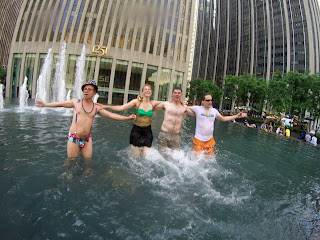
































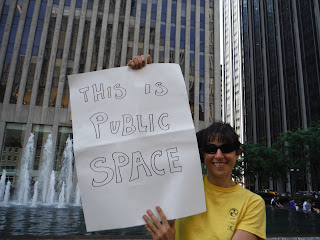



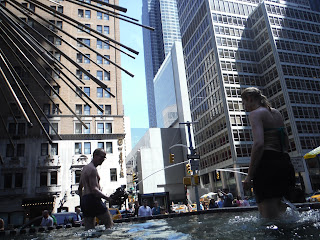






















































































































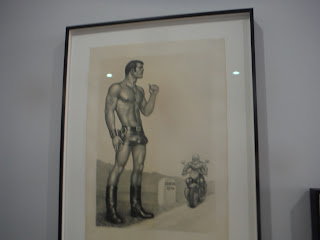

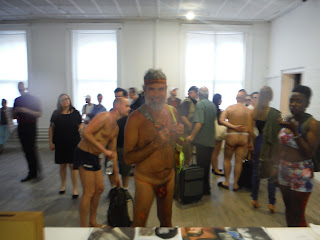
































No comments:
Post a Comment